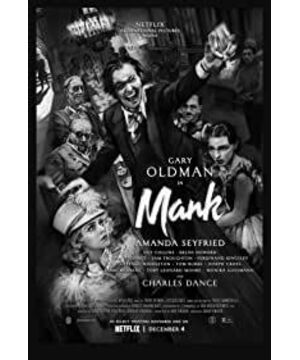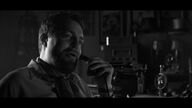If Orson Wells can be counted as the "mountains" in the history of world film or the history of American film, then it can be called the mountain that laid the foundation, and it must be the famous "Citizen Kane".
The iron gate of the Shangdu Manor and the first scene of the movie are hung with such a sign that reads "NO TRESPASSING"-"No one enters", an important American and newspaper magnate Charles Foster Kay En refused people to walk into his world and his life. For the unknown mystery, the Rosebud that Kane could not let go of before his death is fascinating, Kane’s luxurious mansion, life, lace news, political ambitions , The lofty ideal is the deep motivation for people to be eager to explore.
Entering the text of "Citizen Kane", what kind of journey is it to understand a person? In literature, the viewer (I) can connect the "I" in the book with the viewer himself and enter the world constructed by words; in the movie, it is the viewer (I) who takes an imaginary and intentional " "Self" is projected onto others, and "others" exist as him as they should, and I participate in it, and as such, I provide the viewer with a certain virtual and symbolic satisfaction. A person’s objective existence with me must be connected with my subjectiveness through some kind of link. It is not difficult to think that only when it comes to memory, the subjectivity of others or me can be truly subjective, so in fact, images are also Only when it comes to memory can it be truly subjective. At this time, the subjective image, by reproducing a certain personal perspective, becomes the actualized expression of a past reality related to a person present. The specific behavior of this person is vivid, replacing the voice-over commentary of the inner monologue, and clarifying the distance between the present and the past. , Throwing images into internalized reflections, feelings, and impressions obtained through feelings, appearing at the same time as the behaviors that can explain them, giving the images the only real subjective attributes that can be realistically pursued: the reversal of memory, the actualization of thinking, belonging The objectification of personal impressions experienced in the past. But this subjective attribute will definitely not be direct subjectivity. In short, it is only the subjectivity experienced by the viewer through the identification of the imaginary community that is neither him nor me.
Memory is embodied in "Citizen Kane", which is a large number of flashbacks, flashbacks presenting the things the person thinking of the person who is recalling. These things are always the same as the scenes shown in the previous paragraphs, or "directly" to the viewer. The scene that may be seen in the scene of the incident is the same, and the memory activity itself at this time can confirm the subjectivity. The thing you think is no longer a “fragment” of the past that is put into the present, but the restructure of the past through memory. The point of recollection will never be the point of view of the memoir, but the point of view of the invisible witness. It seems that the builders of Shangdu Manor, which no longer exist, are restoring the manor today, rather than the manor designer. Imagine. The action of remembering things that appear in consciousness is one of the many characteristics of memory. The memory can only be a delusion according to the time sequence of the remembered things. Therefore, the memory is presented as the result of gaze from the personal perspective. It is like looking at the photos of the past, as if looking down at the important moments in the past life. These moments are contrasted with each other according to the psychological structure of the current thinking. The presence of the narrator and his psychological monologue opposes the past. The content of the memory of the person is thrown back to the past and becomes a part of his/her present self. It can tell the viewer the information about him/her. The images are reproduced in a non-chronological manner and presented from different perspectives, which are disturbing in consciousness. The thinking brought about by his actions put the past events in the flow.
In "Citizen Kane", the life of the protagonist Kane is reconstructed through a number of personal memories. Everyone makes a description of Kane when asked by reporters. It is not Kaine that is presented to the viewer. En's original appearance, but the opinions held by several narrators of him at a specific moment. The memories of the past of different people, different times, and different life periods undoubtedly appear in the memory and often replace the faces of real characters, in various time dimensions. As the "psychological space" composed of elements, its composition comes from conflicts with multiple perspectives of reality and currentization. The reality and currentization involved here is a rigorous "frame", which will more or less make the pre-set characters go straight to their own destiny. The selected situations in the "frame" can be arranged in a cleverly arranged manner. The structure is balanced, coordinated with each other, and echoed with each other. In fact, all actions of a person or Kane are placed at a certain "moment" outside of the actual time process, and this moment condenses all the consequences of the action, then this The field action is like a destined number of days, inevitable, just like the destiny reflected in the death of Kane at the beginning of the film and the moment when he misses the "rose bud" in his mouth. Therefore, the transcendence of the "tragedy" feature of "Citizen Kane" mainly does not come from the content itself, but from the effect of the structure. The content itself is in principle interdependent with the structure. The multi-axis perspective of "Citizen Kane" at different times and in different directions reproduces Kane's life in various situations, constituting a retrospect of the specific past in the present tense. However, this is just a review of the relevant aspects of the various parties surrounding Kane. It is not a retrospect of Kane, but Kane’s "evolution" is actually "the second wife Susan", "Kane's general manager Bernstein", "Kane's close friend Jed Lilan", and "the housekeeper". The subjective time of each character is not the subjective time of Kane himself, but the subjective time of several roles of Kane. They transfer their own time to Kane, thus making time objective. . Kane’s externality can only be seen from the "external". It is the protagonist’s objective authenticity and the subjectivity of others. Objectivity has become the best cover for the true nature of the character. It can even be further said that the objective phenomenon is the most important thing in itself. Good cover.
Therefore, the so-called "preface" of the modernity of the seventh art in "Citizen Kane" narrates that the film is ultimately a form of consciousness created by people to recognize themselves, although one needs to perceive reality before perceiving themselves, and the only sensible reality is The time reality that is being experienced now, the seventh art or other art forms are also incapable of difficulty, because there is and only this kind of reality, which is the only form of our vivid existence, and the film reflects reality through equivalent forms. It is precisely the need for the plot action to be displayed in the present tense, so that the viewer can experience the time continuation of the "actual experience" of the characters in the image. The form of the film is a secondary creation, and because it must borrow concrete reality in principle, the viewer can only understand and grasp the stories of others or the memory of others that must be objectified in a certain way, and these stories are in opposition to the referent. The meanings of the viewers are different, so it is impossible for the viewer to fully participate in a subjective reality that flows in consciousness. This kind of “distance” that must exist allows each viewer to maintain a minimum consciousness.
Written by Herman J. Mankiewicz, "Citizen Kane" directed by Orson Wells is based on the original publishing magnate and newspaper magnate William Randolph Hirst. Fictitious biography, intertwining several people’s descriptions of the same person and the same thing, and each person’s views on himself and experience must be linked to others’ views on him, so that the multiple consciousness manifestations are not single but multiple. Emotional participation makes itself fictitious. In order to make the characters "seem" as if they live in the "inner" of the characters, the actual existence of Hirst corresponds to the Kane in the movie. It is the result of the interweaving of multiple consciousnesses. It is something that a subjective individual cannot do, that is, to be a human being, one must be intertwined with others, and I and we must be the truth of life as one. The greatness of "Citizen Kane" also lies in the fact that it writes the fictitiously, and then uses the image of fictitious to actuality to tell the purposefulness of life in the world, although you as a viewer may not like it, and don't want to know Kai Well or Hearst, but you can definitely want to understand yourself soberly, then the mirror of others is the best way, and at the same time it is precisely the reality of "Citizen Kane" as a movie, and the movie as a reality that is not true. A certain film nature of the film, that is, the interweaving of the reality of the film and the real reality, and you can also recognize the film itself. At this moment, the film and people are in harmony in such a wide range of dimensions, which further verifies that "life is like a movie, and film is like life". The purposefulness of the modern preface of the film to recognize people.
To enter the world of "Mank", the first thing that catches the eye is the background introduction directly entered by David Fincher with words. Then the crux of the problem can first be understood. This should be that except for the knowledgeable insiders, there may be few people. Not to mention the fact that a large number of viewers do not know the characters and backgrounds mentioned. Compared with the established tragic fate of "Kane" using visual and audio narrative in the opening scene, it can be said to be quite crude.
The following retro-style title and credits can also clarify the audio-visual style that Finch wants to pursue in this film. After the story advances for a while in the next present tense, it will be directly accompanied by the scene of the drama page. The flashback to the beginning on the screen, the segmentation of the scenes presents full theatrical characteristics, and the narrative style of the film has begun to take shape. Here, Vinci uses a two-line parallel narrative in the present and past tense. Unfold the story. In the present tense, it is Mankiewicz who wrote the script of "Citizen Kane". The final completion of the script is a deterministic ending, so there is no mystery, and irony is the main tension. In the past tense, it was Mank who The past before writing the script of "Citizen Kane" is also the true source of inspiration for the script. It can generally be regarded as revealing the ironic tension of the past. Combining the mystery and unknown of various experiences constitutes suspense, and forms the present after the two lines cross. The real state of mind, that is, combined with Mank’s "tragic" script writing and reminded manuscript experience in the present tense, forming empathy, it is not difficult to find that if the two lines finally cross, the change in the mental process is the real suspense. Where. In the story of "Mank", irony is adopted in both the past and present tense undoubtedly in order to broaden the different three-dimensional understanding of the characters, but such a treatment will inevitably fall into a situation of self-deconstruction, because both rely on the "citizen" The fact that the script of "Kane" was completed, once understood why Mankiewicz would write the script of "Citizen Kane", it was immediately closed. Then in the current timeline, the irony at the beginning was already completed after the middle script was completed. In fact, it loses its position and loses its tension. Old friends who are only constantly visiting persuade him that if it turns into an inevitably bleak future, it will be reduced to an irony that is similar to irony, and then only wait for the irony line of the past to close it. Vinci has joined the game over the script's authorship here to seek a breakthrough. Then he will face the inevitable outcome of the above-mentioned deconstruction here, because as long as he gets the signature of Wells, he will be unyielding and unyielding in the past. The meaning of fame and wealth only for ideals is completely dissipated here, and the viewer loses empathy and becomes a forced act; and if there is no signature, everything on the current line can end in true hopelessness, but the viewer is already based on higher information When the level is separated from it, the empathy in it will inevitably be lost, and it will become a forced act. Then, in the past tense, the disillusionment of left-wing political idealism, the death of a friend from a bomb, and the natural character of being in a high position but incompatible with the high-positioned personality makes him fall into a tragic color that is not caused by structure but only by content. , Further weakening the present tense after the two lines are first parallel and then crossed, the fate of the genius screenwriter is disillusioned, and only one idealist self-destructed after a failed struggle. Multi-line reaction with "Citizen Kane" flashback
In terms of audio-visual scheduling, Vinci took a clear “studio shooting” style on the “outdoor” scene. The radio was unexpectedly empty and expanded. It is possible to vaguely guess that the clouds, green hills, and trees in the depth of field were all made with special effects. In the indoor scenes, a lot of parody of "Citizen Kane" and cautious use of depth-of-field lenses, but lack of Vinci's obsessive-compulsive perseverance of sensory control. The reason for this is believed to be Vinci’s deliberate style of “omnipotence” in order to prove the “omnipotence” of the golden age. The rebellion of rejecting his usual audio-visual routine style.
Comparing "Citizen Kane" and "Mank", the "intertextuality" between the two is just like the "intertextuality" between Mankiewicz and Wells. This "intertextuality" implies a relationship with the film art institute. The deep feelings of love and hatred, dreams and life goals and even soul sustenance that can be pursued with the movie, but Mankiewicz’s soul box and the heroic spirit of Wells in "Citizen Kane" are more than present. In addition to the specific person and temperament of the time, it is also the eternal pursuit of human beings after the Enlightenment, and even earlier, to further modernity and de-enchantment/re-enchantment. In "Mank" , Vinci asked for the rectification of the honor destined to be above the highest hall, and even more to meet his own wishes, and then boil down to the biographical odes of the specific person, thus missing some more distant confidence. Although we can generally witness the visual decline of Hollywood standards, this is probably what Hollywood and even American society need more now, that is, to attribute the honor of the new media model that distinguishes gender, race, class, and even the traditional media model. Deserved belonging, the story of Herman J. Mankiewicz, who is both a screenwriter, a writer, and an idealist, can undoubtedly serve as such evidence.
View more about Mank reviews











